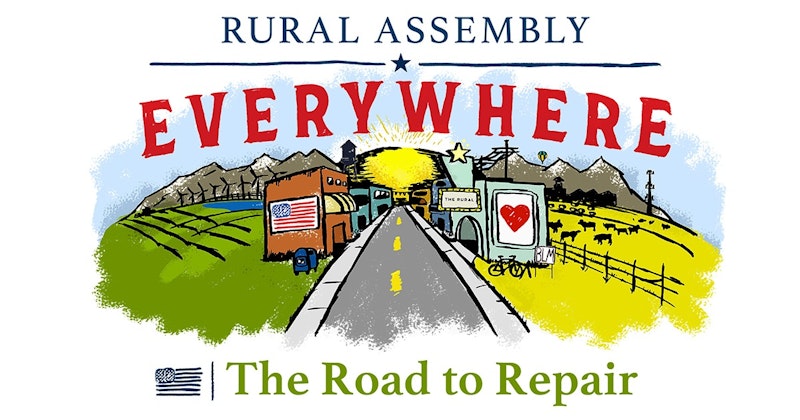In January, President Joe Biden said the word “unity” nine times in 20 minutes during his inaugural address, nodding to a renewed interest among many—especially given the conspicuous and violent divisions of recent months—in bringing people together in spite of their differences.
But the ideal of a “unified” America is easier to pursue than to achieve. Many organizations have been trying to connect people across all sorts of divides for years, a kind of work often referred to as “bridge building” or “peacebuilding,” long before today’s fevered divisiveness. The urban-rural divide is a common trope that also received a hat-tip in the president’s inauguration speech.
Joseph Bubman, executive director of the peacebuilding organization Urban Rural Action, has spent a lot of time thinking about this particular division.

“The reason that we called our organization Urban Rural Action is that the urban-rural divide is in many ways a proxy for other divides of our country: different levels of racial, religious and ethnic diversity, different levels of foreign born residents, different political leanings,” said Bubman over Zoom.
As Bubman and his team see it, the urban-rural divide is just one framework for understanding some of the differences creating tensions in America. After all, ruralites and urban dwellers struggle with the same problems, they simply manifest differently in different locales.
“If you look at any issue in our country, whether it’s economic hardship, food insecurity, criminal justice issues, housing, transportation, those are issues that impact urban and rural communities alike, they just impact them in different ways,” said Bubman. “The solutions might be different, but there’s certainly something that can be learned from urban to rural and from rural to urban.”
This mutual and reciprocal sharing and learning between groups is something a lot of bridge-building efforts are interested in cultivating.
Harry Gottlieb, founder of the bridge-building organization Unify America launched a project called the Unify Challenge last fall, in which challenge-takers are paired to work through a set of questions together and talk about their differences.
Interested participants can sign up for the challenge on the Unify America website, where they answer an introductory set of questions by themselves and are then paired with another participant who differs from them in some way, be it age, race, gender identity, geographic location, political leanings, or any combination of other such factors. This potentially unlikely pair then meets over a video conference to work through a series of hard questions about values and policy priorities, together.
The Unify America website says that the Unify Challenge aims to “replace politics with problem solving.”

“It goes beyond just reducing contempt,” Gottlieb said in a phone call, discussing his team’s broader vision for the project. “The first step is having people stop demonizing each other. We’re operating in a world right now where if you voted one way, or you voted the other, or you call yourself liberal, or call yourself conservative, you’re imagined to be someone who you very likely are not, a kind of a stereotype.”
Gottlieb said that many people who’ve finished the Unify Challenge come away with a greater sense of hope and the feeling that “we really aren’t that divided on the things that matter.”
While contact between people with different backgrounds and circumstances might foster understanding and connection in some cases, there is research to suggest that communication alone is not enough.
The Robbers Cave Experiment, conducted in the 1950s by researcher Muzafer Sherif and his team, found that increasing the amount of contact between two groups that were at odds did nothing to resolve intergroup conflict. However, prejudice and tensions were greatly reduced by forcing the groups to work together toward common goals.
The Urban Rural Action team thinks about this, and other similar research, as they shape their programming. Before Covid-19 made in-person interactions nearly impossible, they were organizing homestays between urban and rural communities to create shared experiences, and they’ve experimented with including things like blindfolded chocolate taste-tests in gun violence prevention workshops to introduce a different point of entry for connection among participants.
“If you work together on shared problems, you build relationships in the process. And if you build relationships, you’re better able to work together on shared problems. We see those two pieces as mutually reinforcing, and we do believe that dialogue is useful but not sufficient,” said Bubman.
Similarly, Gottlieb and his team are keeping this research in mind as they plan for the future of Unify America, and the way Gottlieb tells it, the Unify Challenge is just the beginning. Down the road, he and his team intend to introduce a series of training exercises to help people develop “civic muscles.”
Many of these exercises will be structured as games that participants play in small groups online, or in-person when it is safe to do so. Participants will earn points as they play, ultimately aiming to achieve a top merit level “kind of like an Eagle Scout” as Gottlieb put it. Ultimately, the people who’ve reached the top level in this “citizen basic training” will be invited to participate in an All-America citizens jury.
On the phone Gottlieb shared a glimpse of his ultimate vision, one that he hopes to achieve by 2026. “This jury will be made up of committed Americans from all walks of life who want to serve their country. What we’re talking about is a massive experiment in civic problem solving—the mission of the All-America jury will be to identify a shared set of solutions to a shared national goal, by virtual consensus.”
You can hear more from Urban Rural Action and Unify America at Rural Assembly Everywhere. The virtual festival returns on April 20 and 21 and features civic and community leaders, authors, poets, musicians, and much more.
Learn more and register.




